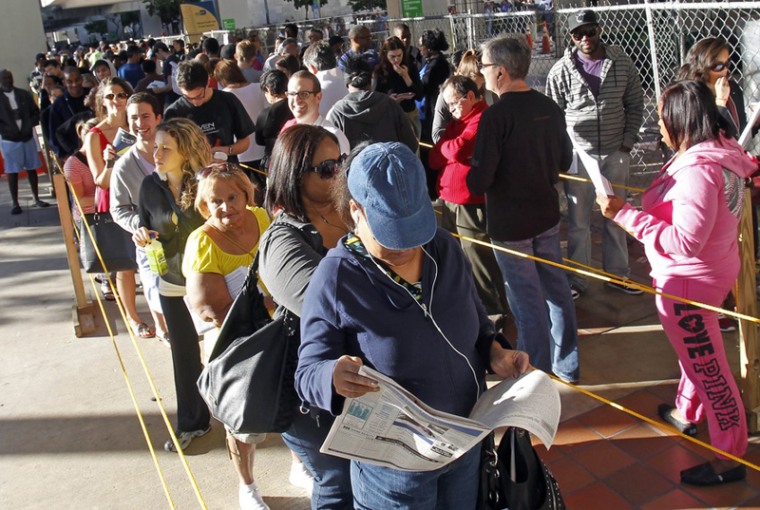The Washington D.C. lawyer representing the Alabama county that wants to strike down the heart of the most effective civil-rights law in history specialize in cases aimed at making voting harder for minorities.
William Consovoy also last year argued on behalf of Republican officials in Florida and Ohio, who in both cases were seeking to significantly reduce the days allotted for early voting, which blacks take advantage of more than whites. Consovoy, a former clerk for Justice Clarence Thomas, is a partner at Wiley Rein, a Washington, D.C., law firm that bills itself as the best in the country for election law. Bert Rein, one of the firm's principals, also is listed on court documents as representing the plaintiffs.
The Supreme Court will begin hearing arguments in Shelby County v. Holder Wednesday. And the involvement of Consovoy and Rein in the case, which challenges the constitutionality of a key part of the Voting Rights Act (VRA), underlines the extent to which it’s a product of the broader partisan voter suppression campaign pushed by Republicans last year in a failed attempt to defeat President Obama.
In 2012, Ohio’s Republican Secretary of State Jon Husted caused an outcry when he ended early voting in the three days before Election Day for everyone except members of the military. The change would have made it harder for hundreds of thousands of Ohioans—disproportionately African-Americans—to vote. As Rachel Maddow and msnbc.com noted at the time, Husted brought in Consovoy to defend the move in court, after it was challenged by the Obama campaign. Ultimately, the court required that the early voting days be restored.
Also last year, Florida Republicans passed a law that cut back on the state’s early voting days. Among other changes under the new system, polls would have to be closed on the Sunday before the election—a day when many black churches help get their members to the polls right after services. The Justice Department blocked the law. As The Nation's Ari Berman recently noted, Wiley Rein was brought in by Florida to argue the case in court. Consovoy claimed that reducing early voting was necessary to combat voter fraud—though there’s almost no evidence of significant fraud occurring. The early voting days were ultimately restored, though long lines nonetheless plagued both early and Election Day voters in the Sunshine State.
To block Florida’s early voting cutbacks, the Justice Department cited Section 5 of the Voting Rights Act, which allows the federal government to stop any election changes in most southern states if they’re deemed to reduce minority voting power. It’s Section 5 that’s at issue in the Shelby County case that goes before the Supreme Court this week, and voting-rights advocates have held up the Florida case as an example of why the provision is still needed.
Consovoy, who did not respond to a request for comment from msnbc.com, will likely find a friendly audience from at least one Justice: his former boss Thomas, who has written that Section 5 is unconstitutional.
Wiley Rein boasts on its website that it has “the premier Election Law & Government Ethics Practice in the country,” and it was described by one legal ranking publication last year as “the gold standard in this business.” Jan Baran, the Republican lawyer who heads the practice, argued the Citizens United case before the Supreme Court, which eviscerated the system of campaign finance regulations.
In the Shelby County case, Wiley Rein has received support from the Center for Individual Rights (CIR), a conservative non-profit that led an unsuccessful 2006 effort to stop Congress from reauthorizing the VRA. The group's role in pushing the Shleby Co. case was detailed recently by The Nation's Berman.
